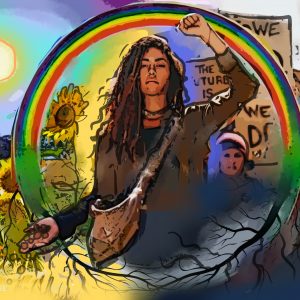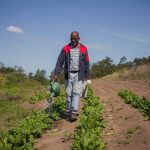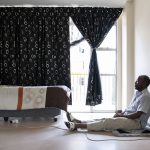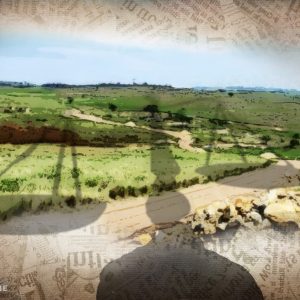Long Read | eSwatini’s history of forced evictions
Companies and the government have been evicting small-scale farmers off the land they have lived on and worked for years. Many have lost homes – and more are on the line.
Author:
8 July 2020

A private investment company snatched away Gavin Khumalo’s farm, a source of pride for him and his family. This is part of a growing culture of companies and the eSwatini government evicting farmers and leaving them nowhere to live.
The 60-year-old is a father to several children, four of whom are still young. He spent most of his life in Embetseni, a village nestled in the foothills of Mlilwane.
“You know, you can’t separate me from the farm life. My father was a farmer himself. He brought us up in a way that for you to have food on the table, you must work for it. We used to grow maize, beans, a number of crops and vegetables to make sure that there is food all the time for the family,” he recalls.
Life was good for Khumalo in the village, where there was an abundance of bananas, guavas and avocados, which he sold in the market. Khumalo had five hectares of land. His 14 cattle grazed on three hectares, while the remaining two were reserved for annual crops. To call such fertile land home is a blessing, he says. He had also built a three-roomed brick house. “It took me about four years to complete the [house], because I was building at my own pace.”
Related article:
But all of that now is gone. Khumalo says the trouble began in 2010, when a company called Umbane claimed ownership of the farmland. “So, from all these years, we knew this as our home. It was a surprise to us,” he says.
This is not the first time this has happened in this family. Before moving here, they lived up in the Malkerns hills. They had to move when the place became a pine tree plantation. As a result of that development, King Sobhuza II urged Khumalo’s forefathers to relocate to a place not far from the hill.
Umbane evicted them to plant sugarcane. For Khumalo, 9 April 2018 remains a painful day. The company sent bulldozers onto their farm. “We went to our chief to report the matter. It did not help. We tried to go to other structures in the country to get assistance. So, unfortunately, our own Constitution was violated in terms of making sure that we are provided with compensation when we leave here.”
‘Where are we going to sleep tonight?’
Khumalo’s children came back from school just as the demolitions were going on. He recalls his youngest daughter asking: “Daddy, are they going to build another house for us?” He replied, “Unfortunately, my daughter, no.” Bewildered, Khumalo’s daughter asked, “Where are we going to sleep tonight?” Khumalo had no answer.
Now, he is squatting in a shack he’s built in his older brother’s yard not far from the village. “At my age, how am I going to really come to terms with this? And my children keep asking me, ‘Are we ever going to get another place? Are they going to compensate us?’ Even today, they ask me those questions.”
Sonile Mangwe’s homestead was also demolished. The 60-year-old relays the story of her six-year-old grandchild, who has a speech impediment, asking her what happened to the house they used to live in. “I told him that our home was demolished, and currently, we are homeless. But we are yet to build another one.”
The displaced residents have had to rent elsewhere within the surroundings of Malkerns. Mangwe says, “Where we are staying now, the cost of living is too expensive and we’re barely keeping up.”

Cinisile Dlamini, a mother of six, echoes similar concerns. Speaking next to the rubble that used to be her family’s home, now overgrown with weeds taller than her, she recalls that a single avocado tree would produce enough avocados to pay her children’s school fees.
While speaking, she begins to cry. “Life is unbearable now. We must find money for food, rent and also to pay school transport fare for the children. Before we were evicted, we were able to plant, harvest and sell the produce to the market. We also had a surplus of food.”
Not only did they lose livelihoods, they also lost their identity, dignity and ancestral remains. Annah Dlamini, who works as a knitter in Manzini, says they slept under some trees for the whole week without any assistance. When she arrived home during the day of the eviction, there wasn’t much to save. “What Umbane did to us, is a serious tragedy. Our hearts will never heal from this, the pain is so deep.”
“When I see an investment like sugarcane, I really feel bad, because for me it says, people that are surrounded by sugarcane have to be evicted,” says Khumalo. “Because it is not only us. There are other communities as well, where people have been moved from their ancestral land because there was development of sugarcane.”
New Frame wrote several emails to Umbane Pty (Ltd), to ask how they acquired the land and why they evicted residents without offering them alternative accommodation or compensation. There was no response.

Vuvulane: a brief history
In 1958, 10 years before independence, the British empire’s Commonwealth Development Corporation (CDC) acquired the title to Farm 860 in Vuvulane, an area in the north-east of eSwatini not far from the Mozambique border. On this land, green with sugarcane fields stretching for kilometres, impoverished farmers whose homesteads were old and crumbling stayed in defiance of numerous eviction orders and all sorts of abuse from the RES Corporation, formerly known as the Royal Swaziland Sugar Corporation (RSSC). The company is owned by the king through Tibiyo TakaNgwane (wealth of the nation), an entity created through the Royal Charter under the stewardship of King Sobhuza II.
In 1962, a settlement scheme for farmers called Vuvulane Irrigated Farms was established. The best farmers from all over the country were invited to apply for small holdings. Each would be allocated eight acres of land on which to grow sugarcane. Applicants had to be citizens of eSwatini, healthy, of good character and willing to make their home at Vuvulane. Married men with families were preferred, says Sehlephi Nxumalo, 87, who settled in the area in 1963 with her husband who has since died.
By 1972, the number of established families in the area had increased to about 197 homesteads. They came from the outskirts of Lavumisa, Hhohho, Mankayane and every other corner of eSwatini. Upon joining the settlement scheme, farmers obtained leasehold titles to their land, with the understanding that after 20 years, ownership would revert to them.
“We worked hard for this land. We knew that the English [people] would leave the land to us … And, indeed, when they were leaving, they told us that ownership of, and responsibility for, the land would fall on us now. Even the late King Sobhuza II called us and said, ‘[Vuvulane farmers], [this] is your land now. I have spoken to the English,” says Mphisi Dlamini, 84, who has been a Vuvulane farmer since 1963.

Queen Ntfombi’s role
King Sobhuza II died in 1982. Instead of the farmers becoming owners of their acres, title deeds to the land were transferred to the “nation” by Queen Ntfombi, making it communal land under royal control. Administration of the scheme was then transferred to a newly formed company called the Swaziland National Agricultural Development Corporation (SNADC). The company was formed by the queen without consulting the farmers. Sixty-two farmers refused to sign papers to be under SNADC’s administration.
“When they came here to enforce SNADC, 62 of us stood aside and refused to sign. [Members of the royal family] told us that this is the king’s company and we had to comply. So, we went down to the royal residence and sought an audience with Queen Regent Ntfombi. She said that she knew not a thing about farmers having to sign away their rights to SNADC. These princes, led by Prince Mfanasibili, still went ahead and informed us we would be evicted because we refused to cooperate with the king’s company,” says Msolwa Dlamini, 68.
This was in 1983, a year after King Sobhuza II died. Fourteen farmers and their families were evicted that year. Those whose turn had not yet come, including Msolwa Dlamini, went and occupied the royal family residences in Lobamba as a form of protest.
A series of abuses
The year Mswati III was crowned king, in 1986, Tibiyo TakaNgwane assumed ownership of the Vuvulane farm. This meant that these farmers, many of whom had been there for over 20 years, suddenly became squatters. These men and women and their families who, though deprived of title deeds to it, had become owners of the land under the Swazi Nation Land (SNL) system. Over 60% of eSwatini citizens have their homes on SNL, even though the land is controlled by traditional leaders on behalf of the king.
Tibiyo TakaNgwane, in attempts to enforce their own administrators, have over the years accused Vuvulane farmers of theft and other crimes. Farmers have been arrested and held in police cells. Most of the times the farmers have been tried, the courts have ruled in their favour. In 1999, Tibiyo TakaNgwane brought an interdict application to stop the farmers from planting crops other than sugarcane. The court ruled in favour of the farmers, saying the entity had no legal standing to bring the matter to court in the first place. The matter was taken to the Supreme Court of Appeal where the high court decision was upheld.
In a press statement released in 17 December 2018, Absalom Themba Dlamini, Tibiyo TakaNgwane’s managing director, said: “It is important to note, however, that the Vuvulane Irrigated Farms project was intended to benefit the whole nation and generations to come, and not only the farmers who were allocated farms in the early stages of the project.”
Related article:
According to one Vuvulane-based farmer, Allen Mango, who over the years has become a land activist, the farm is over 20 000 hectares and the farmers, about 302 families, occupy only 1 200 hectares. The rest of the land is being ploughed by the RES Corporation. “I can’t call it greed; I can safely call it evil. They are treated like squatters and threatened to be evicted any day,” says Mango.
The RES Corporation managing director Nick Jackson told New Frame the company “notes with concern malicious allegations that are circulating on various media, particularly social media, to the effect that RES has been involved in evictions of families in Vuvulane in 2016. RES wishes to state categorically that we are not aware of and have had absolutely no involvement in any alleged evictions. We do not own any land in Vuvulane and therefore we do not have any basis to evict anyone. No farmer group or individual has brought any allegations of eviction to RES … We respect the rights and interests of others.”
Arrested
Mango was arrested in 2013 for making comments deemed contemptuous of the king. Part of the charge sheet read: “[Mango] wrongfully and unlawfully made comments which brought hatred or contempt against the King of Swaziland, King Mswati III, so that he can be hated by his subjects at Vuvulane.”
He was arrested on a Saturday. “I appeared at Simunye Magistrate court,” he recalls, adding that he was remanded and was supposed to appear in court again on the Tuesday the following week. But on Sunday morning around 3.30am, the police drove him to another police station in Big Bend. He suspects the police wanted to kill him.
“They gave me my phone and luckily it still had the battery. That’s when I called my lawyer. He was surprised and according to him there are no admissions done on weekends unless there’s an order,” Mango says, adding that Kush Vilakati, his lawyer, who lived in Siteki, dialled the desk office to enquire. “They said they were taking me to the remand centre.”
‘The police were instructed to kill me’
The police drove him to his lawyer, to sign a document releasing him. His lawyer refused to sign the document and said: “I will follow you and the officer in charge will sign the commissioning papers.”
Mango, New Frame’s link to the Vuvulane farmers, believes his phone is tapped. On arriving at a site for a meeting with the farmers, New Frame found police officers waiting. No one had told them about the meeting. They sat through New Frame’s interviews, even asking questions afterwards, wanting to know where we had booked our accommodation and how long we intended to be in the country.
Related article:
“The police were instructed to kill me on that day. They were not expecting that my lawyer would refuse to sign and instead said he will follow us. I am certain that in the middle of the road, somewhere around Hlane, they were going to release me from the van and tell me to run – then shoot me instantly.
“What actually happened at Big Bend confirmed my suspicions, because when we arrived there, the officers said: ‘We do not admit people on weekends.’”
Mango’s case was heard in court, and he was granted bail. Seven years later, he reports to the Tshaneni Police station every month. The police have refused to drop the case.
Government evicts Nokwane residents
Some residents have been evicted by the state, or in the name of the king, usually for vanity development projects.
In Nokwane, just outside Matsapha, residents’ houses were demolished in 2014 to build a Royal Science and Technology Park (RSTP) on an estimated area of 317 hectares. The institution is opposite to where most of the residents had established themselves. It is unclear why they were evicted in the first place.
Jabu Vilakati says: “We were told not to worry, only houses earmarked by the fence would be affected. We then got court eviction orders, demanding that within three days to vacate the area.”
On 29 September 2014, machines rolled in and gutted 10 homesteads in Nokwane. The government, having orchestrated the evictions, provided no alternative accommodation. The residents had to fend for themselves.
Related article:
Sibongile Mashaba, 35, is a single parent of five. “It was painful when we were evicted at Nokwane. I was at work and my mother told me that I must come to help her to pick up what’s left after the eviction. They never gave us any chance to take out our furniture. My children had to stay for the whole month without going to school.”
Mashaba has been unable to live with her children since the eviction because she has to be at work at 5am. She works for a hotel in Nokwane, very near to where her home used to be. There is almost no transport from eNdlinilembi, where her children stay. She earns E1 300 (which is equivalent to R1 300) per month, with E700 going towards rent and the remaining E600 going to her children to buy groceries.
“Sometimes at work we sleep on an empty stomach because there’s nothing we can do; we can only fight for the children to have food on the table,” she says. “Where we were evicted, we were farming, there were banana and mango trees. Life was extremely better that side because I was not renting. Now, the rent is very steep on my pocket.”
Three of her children are in high school, and she must pay fees amounting to E4 500 for each child. She’s unable to raise this money from her salary. As she relates her story, tears trickle down her face. “My children see that the situation is very difficult. They say, ‘Mom, we wish to finish school and work in good jobs so that we can help you one day.’”
Her neighbour, Sonto Dlamini, 65, has 13 orphaned grandchildren. “Life is very ugly, when I look at the children, I don’t even know what to feed them,” Dlamini says, adding that if we had come earlier, we would have witnessed her grandchildren fighting for guavas. A few days back, they were fighting for amasi. “When I try to work, I feel weak because of hunger. I can’t even fetch firewood simply because I am weak.”

Seeking refuge in a church
Some of the Nokwane displaced sought refuge in the Southern Africa Lutheran Church based in Manzini. Sydney Nyembe is in charge of the human rights and social welfare desk at the church. He recalls the Nokwane evictions. “Eight families were meant to sleep in the streets. I called the bishop and the dean, [and told them] that I will bring those people into the church. I went to the Red Cross and they said they will not put the tents because it’s private property. I reminded them that their job is to ease pain. After a lengthy discussion they agreed [to intervene].”
The church housed the displaced people for two years. “We then asked where they think they can get land and we will khonta [seek land from traditional authorities] for them. We bought eight cows and sent them to the places [where they could potentially be allocated land].”
The kukhonta process was successful for only a few of the eight families. Many fell into the hands of fraudsters and lost their kukhonta animals too. “To this date, we still have a problem [of some people who are still displaced]. This isn’t over.”
Related article:
Attempts to help are sometimes hindered by patriarchal attitudes, as most of the affected families are headed by women. “The second challenge is that the female cannot khonta. The chief and the inner council need a male to khonta. In 2005, the constitution said whether you are male or female, you are entitled to khonta, it’s written in black and white. However, on the ground, that’s not the case.”
Sibusiso Nhlabatsi, a human rights lawyer based in Mbabane, describes the Nokwane eviction judgment as “scathing”. He says, “It even calls them illegal squatters. You need to be alive and to be sensitive to people. In common law, there’s a concept called ownership by prescription. It says if I am in occupation of a certain property for a period of 30 years, I become an owner by prescription. If you had a government that’s alive to the Bill of Rights and that cares about people, they would have intervened.
“It’s worse at Nokwane because the government went to court and said, ‘I want to evict these people.’ Everyone can do it if the government does it with impunity.”
Nhlabatsi says evictions in the country are a systemic problem, stemming from the top down. To illustrate this point, he told a story of an elderly man whose property is in the vicinity of the king’s Nkoyoyo palace. Government has for years been attempting to push him out of his place, refusing to offer adequate compensation, opting to build him a bungalow on untitled land instead.
In danger of losing homes
In Manzini, there is a sprawling residential area called Madonsa. It is divided into two: one is affluent, the other is a township. To get to the township, you have to pass through the wealthy side, with its paved and labelled streets. You then get to a bridge over a small river. This is the dividing line. Here begins a dirt road that zigzags a little before getting to a crooked “Y”. If you take the right turn and drive a little, you will pass by Mashayinkonjane Butchery, drive some more and you will be welcomed by an abandoned house on whose walls is the inscription: “Stop the evictions.”
Over 700 residents face forced evictions in Madonsa. They are on land allocated to them by the Mnyenyweni chiefdom in the late 1990s. In 2003, four men approached the residents to inform them that they had built on a farm owned by the Swaziland National Provident Fund (SNPF). They were told to vacate the area within 14 days.
SNPF approached the high court in eSwatini for an order to evict the residents from what has now become Madonsa township. On 9 August 2007, the court issued the order. Learning of this development, affected residents banded together “to engage SNPF, asking that they sell us the land [instead of kicking us out]. They would not be engaged on this point, however. No matter how hard we tried,” says Fikile Mbuyisa, a resident activist. They decided to seek an audience with the king, as is the custom in eSwatini.
‘Facing a prince’
“We then got together, raised funds to buy cattle because to seek an audience with the king, you must offer gifts … When we tried to engage him about the land issue, he suggested discussing the matter inside his residence. We then waited, from 4pm … until 7am. He never engaged us after that. And later, we saw him leave,” recalls Mbuyisa.
The residents went to the Swaziland National Council, an advisory body to the king, to seek help. There, they were told that they would get no help as they were “facing a prince”. The chairperson of the SNPF is Prince Lonkhokhelo, the king’s brother. Mbuyisa says, “This is a matter between us and the SNPF. We are not facing him in his personal capacity.”
The eSwatini Human Rights Commission has had some success intervening on behalf of the people of Madonsa, and the SNPF will now consider selling to the residents if they pay an initial fee of E500 000. Failing to raise this sum, residents approached investors, who, after initially promising to help, stopped responding to the residents’ calls and texts. It has been over a year now. The Human Rights Commission chairperson dropped the case because “they involved a third party”.
Related article:
SNPF and African Alliance had not responded to New Frame’s questions at the time of publication.
The people of Madonsa remain apprehensive. They fear that any day now, their homes will be destroyed.
It is not only them. Communities in Gege, Sigombeni and Murray Camp in Manzini have received eviction notices too. These are people who have been on the land for decades. In the absence of sound legislation and a clearly defined land tenure system to protect eSwatini citizens, it is apparent that evictions will continue, especially as Tibiyo TakaNgwane’s ambitions grow and the government thinks of new vanity projects to undertake.






